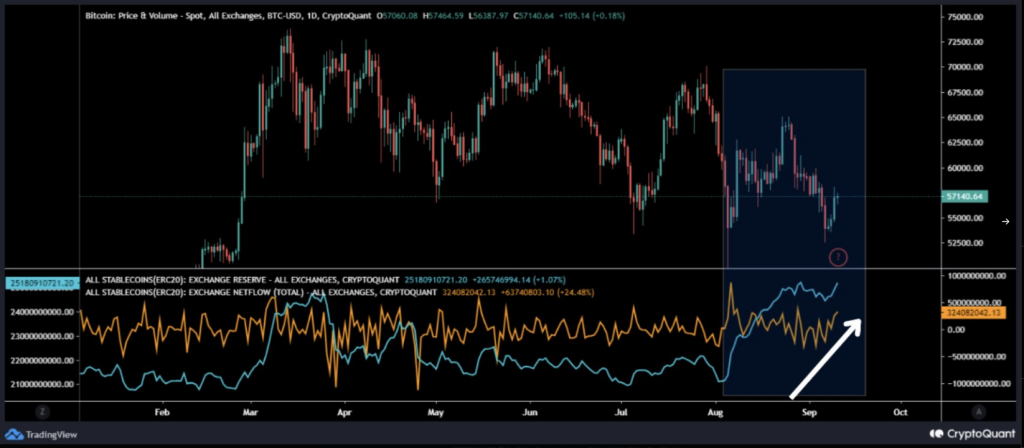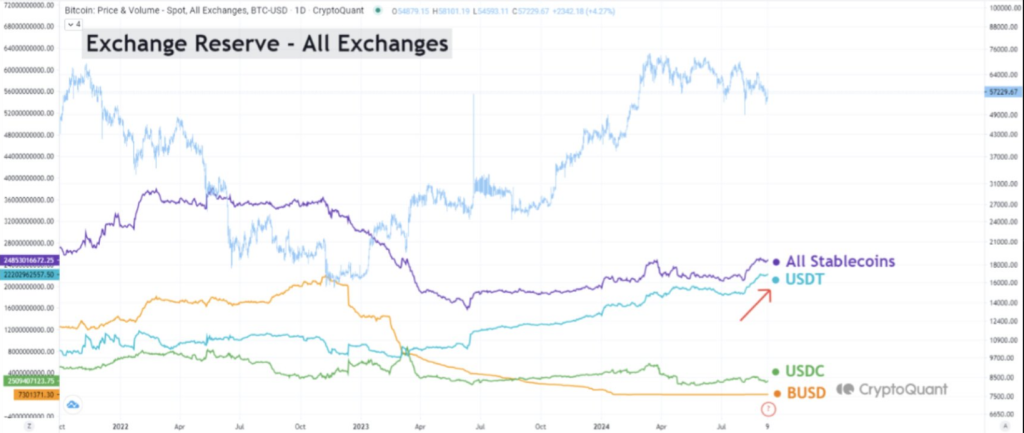ARTICLE AD
Recent changes in the behavior of Bitcoin on the market suggest the coin could be preparing for its next significant bull run. One important consideration is the fall in Bitcoin reserves on exchanges. Less of Bitcoin is accessible for trading as owners migrate it to cold storage. Historically, this kind of decrease usually comes before significant price rises.
Declining Bitcoin Reserve
Reserves of Bitcoin on exchanges have been declining drastically. This drop means that everyday traders are losing control over the crypto while it is being transferred to cold storage. Recent data by CryptoQuant amply illustrates this trend.
Usually, declining exchange reserves for Bitcoin point to declining selling pressure. This thus produces conditions fit for possible price increase. Looking back at past trends, such declines in reserves have sometimes been accompanied by somewhat substantial price swings.
Bitcoin’s Next Bull Run?
“Decreasing #Bitcoin reserves and rising stablecoin reserves indicate a bullish outlook for Bitcoin. As the market supply tightens and buying power builds, we could be on the verge of a price rally.” – By @OnchainTarek
Link 👇https://t.co/frUAfdSBrk pic.twitter.com/4fxB9cowf1
— CryptoQuant.com (@cryptoquant_com) September 11, 2024

Regular Withdrawal Patterns
Supporting these observations, further understanding comes from IntoTheBlock’s netflow data. Over many time periods, the data shows a constant pattern of Bitcoin withdrawals from exchanges. Bitcoin saw a net loss of 8.03K BTC in the past 24 hours alone, while 6.29K BTC was taken out throughout last week.
The netflow has been negative even during the past month. This consistent loss of Bitcoin from markets supports the belief that investors are clinging to their assets, maybe waiting for more favorable conditions to sell.
Increase In Stablecoin Reserves
Apart from the declining BTC holdings, stablecoin reserves on exchanges clearly have increased. This increase speaks to market liquidity rising. Usually, traders are getting ready for opportunities for future purchase.
Increase in USDT stablecoin holdings on exchanges since August
“When stablecoins flow into exchanges and increase their holdings, it is generally interpreted as funds waiting to buy, which will have a positive effect on the price.” – By @Yonsei_dent
Link 👇… pic.twitter.com/wsrY0rCFaC
— CryptoQuant.com (@cryptoquant_com) September 10, 2024
Stablecoins are easily accessible pool of money ready for swift deployment. More stablecoins entering the market indicate that investors are ready to seize possibilities, which may cause a major price breakout.

Looking ahead, institutional interest and macroeconomic elements are also rather important in determining the possible price trajectory of Bitcoin. Although past rate increases by the Federal Reserve have slowed down the crypto asset’s expansion, possible rate reduction could create a more suitable habitat for the BTC.
Furthermore increased institutional demand spurred by potential approval of physical exchange-traded funds (ETFs) could help to further increase Bitcoin’s liquidity and general acceptance.
Bitcoin Price Forecast
The future of Bitcoin excites experts; some estimate a price of $100,000 by 2025. Macroeconomic changes and increasing institutional participation help to encourage this positive attitude. With the decline in exchange reserves and increase in stablecoin reserves, the present market dynamics point to Bitcoin perhaps preparing the ground for its next significant surge.
The indicators suggest a possible Bitcoin bull run. The backdrop created by declining reserves on exchanges, rising stablecoin liquidity, and consistent withdrawal patterns should help to support notable price rises. With improving macroeconomic conditions and rising institutional interest, Bitcoin’s road to $100,000 by 2025 seems increasingly feasible.
Featured image from Pexels, chart from Trading View

 2 months ago
20
2 months ago
20 

